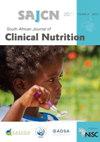‘Drink clean, safe water and/or other fluids through-out the day even if you do not feel thirsty’: a food-based dietary guideline for the elderly in South Africa
IF 0.6
Q4 NUTRITION & DIETETICS
引用次数: 1
Abstract
This review summarises information from available literature to support the dietary guideline ‘Drink Clean, Safe Water and/or Other Fluids Through-Out the Day Even if You Do Not Feel Thirsty’ set for the elderly of South Africa (SA). Water is essential for life and is necessary for important functions of the body like maintenance of tissue structure, blood volume regulation, temperature regulation and excretion of metabolites through kidneys. Though water is necessary for all, the elderly are especially at risk of dehydration due to altered hormonal activity and body functions that reduce their sensitivity to thirst (water intake) and urination (water excretion). Total body water is also reduced in the elderly, so they are unable to buffer the effects of water loss in the body. Therefore, water intake should be monitored properly in the elderly so that they can lead a happy and healthy life and reduce the economic burden due to hospitalisation caused by water imbalance or dehydration, which is common in the elderly. Two litres of water per day is generally considered adequate, but there is no consensus regarding the exact requirement for water as need varies due to climate and physical activity levels. The importance of water to maintain bodily functions and the risk of dehydration substantiate the need for a dietary guideline to address the importance of clean and safe water/fluid consumption regularly throughout the day among the elderly in SA.“即使你不觉得口渴,也要喝干净、安全的水和/或其他液体”:南非老年人的饮食指南
这篇综述总结了现有文献中的信息,以支持为南非老年人制定的饮食指南“即使你没有感到口渴,也要喝干净、安全的水和/或其他液体”。水对生命至关重要,也是身体重要功能所必需的,如维持组织结构、调节血容量、调节温度和通过肾脏排泄代谢产物。尽管水对所有人来说都是必要的,但由于激素活动和身体功能的改变,老年人尤其有脱水的风险,这会降低他们对口渴(喝水)和排尿(排水)的敏感性。老年人体内的总水分也会减少,因此他们无法缓冲体内水分流失的影响。因此,应适当监测老年人的饮水量,使他们能够过上幸福健康的生活,并减轻因水失衡或脱水而住院的经济负担,这在老年人中很常见。每天两升水通常被认为是足够的,但由于气候和体育活动水平的不同,对水的确切需求没有达成共识。水对维持身体功能的重要性和脱水风险证明了制定饮食指南的必要性,以解决SA老年人全天定期清洁安全饮水/饮水的重要性。
本文章由计算机程序翻译,如有差异,请以英文原文为准。
求助全文
约1分钟内获得全文
求助全文
来源期刊

South African Journal of Clinical Nutrition
NUTRITION & DIETETICS-
CiteScore
2.50
自引率
9.10%
发文量
21
期刊介绍:
1.The Journal accepts articles from all basic and applied areas of dietetics and human nutrition, including clinical nutrition, community nutrition, food science, food policy, food service management, nutrition policy and public health nutrition. 2.The Journal has a broad interpretation of the field of nutrition and recognizes that there are many factors that determine nutritional status and that need to be the subject of scientific investigation and reported in the Journal. 3.The Journal seeks to serve a broad readership and to provide information that will be useful to the scientific community, the academic community, government and non-government stakeholders in the nutrition field, policy makers and industry.
 求助内容:
求助内容: 应助结果提醒方式:
应助结果提醒方式:


